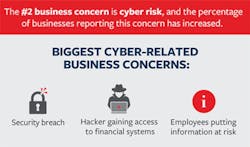The Travelers Companies’ 2020 Travelers Risk Index found that fewer companies than last year have taken steps to mitigate cyber risks, even though the level of concern about these threats has increased during the Covid-19 pandemic.
Less than half of respondents said their organization has utilized hacker intrusion detection software (48 percent), undergone a cyber risk assessment on their company (47 percent) or vendors (37 percent), or written a business continuity plan that could help them respond to a cyber attack (42 percent). More business leaders reported taking each of these precautions just a year ago. This is especially concerning as nearly one in four respondents (22 percent) said their company was a victim of a cyber event, the highest percentage since the survey began in 2014.
Although broad economic uncertainty is the greatest worry for businesses overall, cyber threats are the top concern for large and medium-sized businesses. Cyber also ranked first by companies in public sector industries. The leading cyber concerns among all respondents are:
- Suffering a security breach (52 percent worry some or a great deal)
- Unauthorized access to financial systems (50 percent)
- Employees putting company information at risk (48 percent)
- Becoming a cyber extortion/ransomware victim (47 percent)
- Theft of the company’s customer or client records (47 percent)
- Suffering a cyber event due to employees working remotely (47 percent)
These concerns appear to be driven, in part, by the impact of Covid-19 on businesses’ operations and workforces. The percentage of businesses reporting that at least 40 percent of their employees work outside of the office has more than doubled during the pandemic, from 26 percent to 59 percent. Consequently, businesses find that they need to manage a new set of cyber threats.
“With more employees relying on their ability to connect with company systems from remote locations, and many consumers preferring online transactions in an age of social distancing, it’s more important than ever for companies to do all they can to mitigate exposure to cyber threats,” said Tim Francis, enterprise cyber lead at Travelers, in a prepared statement. “Taking appropriate precautions and having a plan in place should something go wrong will put an organization in position to seamlessly get back up and running. This is critical in ensuring that employees will be able to continue to access systems and maintain productivity, while also delivering a high level of service to customers.”
The survey also found that current events are influencing perceptions about the business environment in general; the percentage of respondents who say the business environment is becoming riskier is up significantly, from 36 percent in 2019 to nearly half (47 percent) this year.
The top five risks concerning businesses of all sizes this year are:
- Broad economic uncertainty (57 percent worry some or a great deal)
- Cyber risks (56 percent)
- Medical cost inflation (54 percent)
- Increasing employee benefits costs (52 percent)
- Ability to attract and retain talent (47 percent)
Source: Travelers





